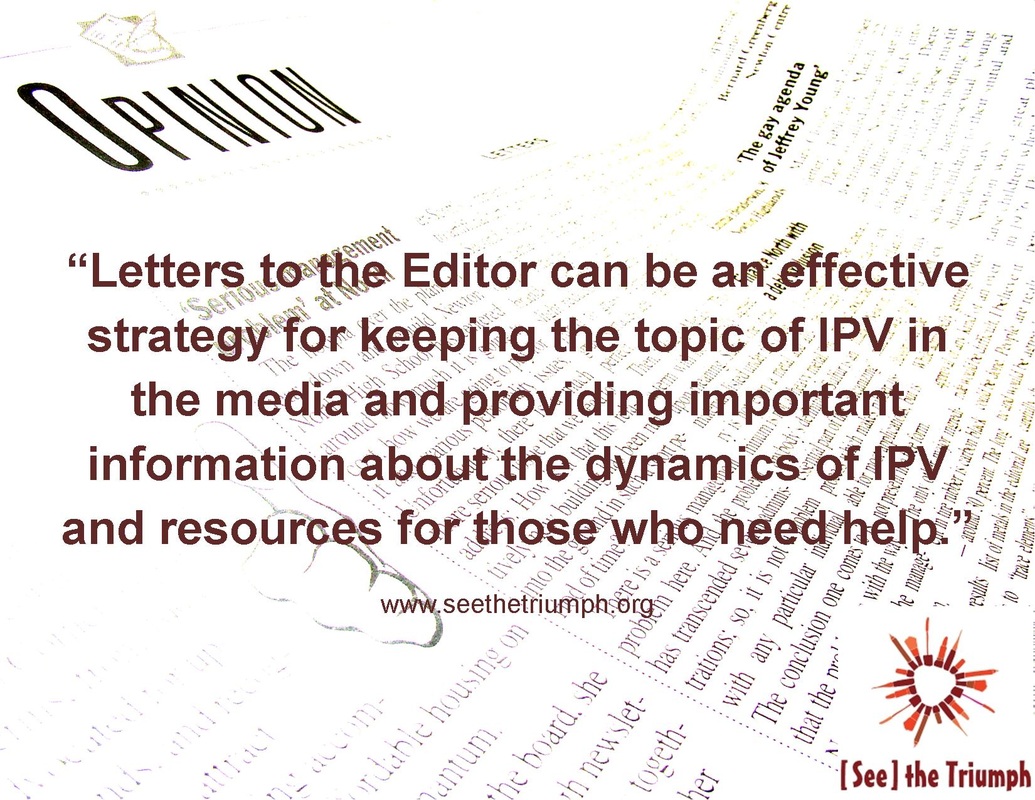|
12/10/2013 Intimate Partner Violence, Stigma, and the Media, Part Three: Writing a Letter to the EditorBy Christine E. Murray, See the Triumph Co-Founder
Let’s say you’re drinking your coffee one morning and reading the newspaper. And let’s say that you notice a story about intimate partner violence (IPV) that’s in today’s paper. You’ve read the story, and while on the one hand you’re probably glad to see that the topic of IPV is getting some media attention, there may be something in the story that doesn’t sit right with you. Maybe the story used obvious victim-blaming language. Maybe the story failed to provide any information about local resources for others in the community who are experiencing IPV. Or maybe you think some of the statistics presented in the story are misrepresented or described in a misleading way. Or maybe, you’re upset because there is no story at all--even though you know that IPV is occurring daily in your community. What can you do? Of course, you could just go on with reading the paper and drinking your coffee, but you also may want to do more to try and challenge some of the problems you saw with how the story was reported. In today’s world, there are many ways to express your opinions publicly, including by commenting on newspaper web-sites and using your own social media pages to share your opinion. And yet, writing a Letter to the Editor remains a viable way to share information and thoughts in a way that can reach a wide audience and foster ongoing dialogue. Many newspapers today even have Comment sections with the on-line Letter to the Editor sections, providing an additional opportunity to engage people in a dialogue about important issues. Anyone can write a Letter to the Editor, and the following sections are important to include with any letter (1, 2): 1. An opening statement: What is the problem that your letter addresses? If it relates to a recent story in the paper, cite the story. 2. The importance of the problem your letter addresses: Why should people care? You may want to provide a brief anecdote or relevant statistic to illustrate this importance. 3. A description of how the problem is being addressed currently: Are you trying to highlight something good that happened? Or are you trying to highlight a problematic response? 4. Your opinion about what needs to be done next, and why: Leave the reader with some action they can take, or they can encourage others to take, to foster more effective responses to IPV. 5. Your name and contact information: Most media outlets will need to verify your identity prior to publishing a Letter to the Editor. Be sure to follow any of the publisher’s additional requirements or word limits when writing and submitting your Letter to the Editor. Letters to the Editor can be an effective strategy for keeping the topic of IPV in the media and providing important information about the dynamics of IPV and resources for those who need help. Consider how you might begin using this tool to help challenge the stigma around IPV and bring more attention to the issue in your own community. Resource: (1) Seekins, T., Fawcett, S. (1984) A Guide to Writing Letters to the Editor: Expressing Your Opinion to the Public Effectively. The University of Montana Rural Institute: Montana. (1) Brown, B., Murray, C. E., & Smith, P. H. (2013). Domestic violence representation in media: A toolkit for advocacy professionals. Poster presented at the UNCG Public Health Education internship poster session. Comments are closed.
|
Archives
April 2024
CategoriesAll About Intimate Partner Violence About Intimate Partner Violence Advocacy Ambassadors Children Churches College Campuses Cultural Issues Domestic Violence Awareness Month Financial Recovery How To Help A Friend Human Rights Human-rights Immigrants International Media Overcoming Past Abuse Overcoming-past-abuse Parenting Prevention Resources For Survivors Safe Relationships Following Abuse Schools Selfcare Self-care Sexual Assault Sexuality Social Justice Social-justice Stigma Supporting Survivors Survivor Quotes Survivor-quotes Survivor Stories Teen Dating Violence Trafficking Transformative-approaches |
Search by typing & pressing enter



 RSS Feed
RSS Feed